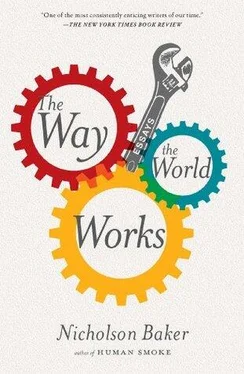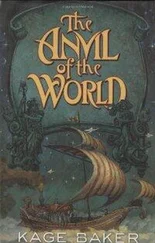Nicholson Baker - The Way the World Works
Здесь есть возможность читать онлайн «Nicholson Baker - The Way the World Works» весь текст электронной книги совершенно бесплатно (целиком полную версию без сокращений). В некоторых случаях можно слушать аудио, скачать через торрент в формате fb2 и присутствует краткое содержание. Год выпуска: 2012, Издательство: Simon & Schuster, Жанр: Публицистика, Критика, на английском языке. Описание произведения, (предисловие) а так же отзывы посетителей доступны на портале библиотеки ЛибКат.
- Название:The Way the World Works
- Автор:
- Издательство:Simon & Schuster
- Жанр:
- Год:2012
- ISBN:нет данных
- Рейтинг книги:4 / 5. Голосов: 1
-
Избранное:Добавить в избранное
- Отзывы:
-
Ваша оценка:
- 80
- 1
- 2
- 3
- 4
- 5
The Way the World Works: краткое содержание, описание и аннотация
Предлагаем к чтению аннотацию, описание, краткое содержание или предисловие (зависит от того, что написал сам автор книги «The Way the World Works»). Если вы не нашли необходимую информацию о книге — напишите в комментариях, мы постараемся отыскать её.
), here assembles his best short pieces from the last fifteen years.
The Way the World Works
OED
Modern Warfare 2
Through all these pieces, many written for
, and
, Baker shines the light of an inexpugnable curiosity.
is a keen-minded, generous-spirited compendium by a modern American master.
The Way the World Works — читать онлайн бесплатно полную книгу (весь текст) целиком
Ниже представлен текст книги, разбитый по страницам. Система сохранения места последней прочитанной страницы, позволяет с удобством читать онлайн бесплатно книгу «The Way the World Works», без необходимости каждый раз заново искать на чём Вы остановились. Поставьте закладку, и сможете в любой момент перейти на страницу, на которой закончили чтение.
Интервал:
Закладка:
Sitting there at the desk I did what you do when you’ve lost your glasses or your wallet or some crucially important document that you need — a note to the principal — I felt around on the desktop of my mind for what I had of John Updike, what I could substitute for the livingness of the man. And I didn’t have anything that would serve, because the tremendous thing about him was that he was alive and writing and revising and reviewing some big wrongheaded biography and releasing another small piece of his own remembered past, perhaps slightly disguised and fictionalized — he was in the midst of being a writing person, as well of course as being a human being who has a wife and a former wife and children and editors and fans. That’s what I wanted from him, and that’s what I didn’t have: evidence of his ongoingness.
The computer started chirping again and there were editors who wanted me to write something about him immediately, a remembrance, an obituary, because a long time ago I published a book that was about him, sort of, and therefore I guess I was thought of as an expert on Updike, when I wasn’t, I was just a mourner like anyone else. So I said, No, I’m sorry, I’m just sad. That’s all I have to offer, just my own sadness.
What I think of now, though, is a time more than twenty years ago, when I saw him in the Boston Public Garden. It was a cold, overcast late afternoon, and there was a man walking toward me on the path. I knew who it was. It was the famous John Updike. We were over past the statue of George Washington, in a part of the garden that has fewer trees, that’s always colder and windier than other parts — and I had to figure out what to do. He was wearing a tweedish jacket buttoned up and a scarf and a hat and he obviously had somewhere to go, as I didn’t, really. If I stopped and I said “Mr. Updike?” he would of course politely stop and we would have a brief conversation. I would maybe say that I liked his writing and that he’d signed one of his books for me once and that I’d sent him a fan letter once that I hadn’t put a return address on because I didn’t want to compel him to answer it and that in the letter I’d told him that my girlfriend, who had since become my fiancée, had dug out of a wicker basket of New Yorker s a story of his and given it to me to read and I’d read two-thirds of it and had decided, walking under the awning of a tuxedo shop in a moment of passing shade, that I wanted very much to write him and tell him about how happy it made me to know that he was out there working. But I couldn’t stop him on his path and tell him all that. He was on his way somewhere. So I decided instead that I would just nod. I would pack in everything I knew about him in my nod, all the memories I had of reading about packed dirt and thimbles and psoriasis and stuttering and Shillington, Pennsylvania, and the Harvard Lampoon and the drawing class at Oxford, and his little office upstairs in Ipswich — and the letters that he and Katharine White had exchanged when he was writing his early stories for The New Yorker that I’d seen behind glass in a display case at Bryn Mawr College — all that knowledge of him I would cram into one smiling, knowing nod. And that’s what I did. And he nodded back, a little uncertainly, I think. He wasn’t sure: Maybe he knew me?
And then later, in a letter, he said, Didn’t we meet once on Arlington Street? He remembered my nod.
What a memory on that man.
His very best book, I think, is his memoir, called Self-Consciousness . He was best when he was truest. And the most amazing thing about his truthfulness is its level of finish. Of polish. Because we all have thoughts. They’re slumped on the couch and they are not at their very best, in fact they aren’t completely shaven and they aren’t all that clean, necessarily. They’re living in the halfway house of what you have to say. What Updike does is he sends them an invitation — it’s tasteful, understated, but beautifully engraved. He says to his thoughts: the favor of your reply is requested — please accompany John Updike to the official writing of his next piece on whatever it is — on the car radio, on the monuments of the United States, on William Dean Howells, who, he said, “served his time too well”—please attend this essay. And then at the bottom it says, very quietly: black tie. Formal wear. That’s what you want from an essay, is you want these thoughts to have done their very best to at least rent their outfits and present themselves to the world in their best guises.
Don’t come as you are, Updike said, come in black tie, put on your best punctuational studs — and they, his ideas, obliged him, repeatedly. They said, Okay, RSVP, we will be there.
We had, I guess you could say, a correspondence over the years. He wrote Dear Nick and I wrote Dear John. I love his reserve. He didn’t really want to have a cup of coffee with me, in fact I think he’d much rather have written me a letter than have a cup of coffee — and who can blame him? But there was one thing I wanted to write him in a letter for years, and never did. One time I read one of his stories aloud to my daughter. She was then about thirteen. I read her a story called “The City.” It’s about a man who is on a business trip — and he has a spot of indigestion that then turns out to be excruciatingly painful — and he goes to the hospital and it’s his appendix and the whole story is just the very simple but well-described account of his hospital stay in a city that he never ends up seeing. And as I was reading it to my daughter, I came to the moment in the story that I remembered from when I first read it. The man is lying in his hospital room in the middle of the night and he hears people moaning on either side of him and then there’s a sound of “tidy retching,” and then comes the sentence: “Carson was comforted by these evidences that at least he had penetrated into a circle of acknowledged ruin.” The word ruin there was so amazingly good and well placed—“acknowledged ruin.” And maybe it was that I gave it a special inflection as I read it aloud, but I don’t think so. My daughter said, “Oh, that’s good.” Right at that moment. She liked and she was excited by the very same phrase in the story that I’d been excited by. It seemed so reassuring to know that there is sometimes an absolute moment in a story that many people will independently discover and remember, even across generations, and that this may have been one of those moments. I wished I had told him that in a letter. And now I’ll never get to tell him that. So I tell it to you. With sorrow. Thank you.
(2009)
David Remnick
David Remnick is fifty-two. He’s got all of his hair, which is black, and he’s got an office with quiet brown carpeting and a desk made of a slab of grainy black wood and a fat-rimmed yellow ceramic cup that holds his pens and his pair of scissors. He’s smart and quick to laugh, and if you sit in one of the square soft chairs in his office, he remembers things about your life that you barely remember. He likes baseball and The Wire and A. J. Liebling and spaghetti with squid ink sauce. You might feel jealous of him except that he works too hard and nobody else would want that kind of constant hellish weekly pressure. His wife, Esther Fein, is a writer, and he’s got three kids. He’s the fifth editor of The New Yorker, which may be the best magazine ever published.
I’ve met Remnick a few times, briefly. Once was at a party where he was chatting about boxing to the novelist Joyce Carol Oates. Another time was in 2001, at the National Magazine Awards. That year his magazine won four awards, including the award for general excellence. Remnick kept striding up to the podium as we applauded him, wearing an impeccable blue suit and David Mamet-style glasses, and each time he found some new way to be abashed and thankful, as he was handed yet another copper-colored trophy designed by Alexander Calder, the mobile-maker. (It’s called an Ellie and it looks like several modernist boomerangs glued together.)
Читать дальшеИнтервал:
Закладка:
Похожие книги на «The Way the World Works»
Представляем Вашему вниманию похожие книги на «The Way the World Works» списком для выбора. Мы отобрали схожую по названию и смыслу литературу в надежде предоставить читателям больше вариантов отыскать новые, интересные, ещё непрочитанные произведения.
Обсуждение, отзывы о книге «The Way the World Works» и просто собственные мнения читателей. Оставьте ваши комментарии, напишите, что Вы думаете о произведении, его смысле или главных героях. Укажите что конкретно понравилось, а что нет, и почему Вы так считаете.












